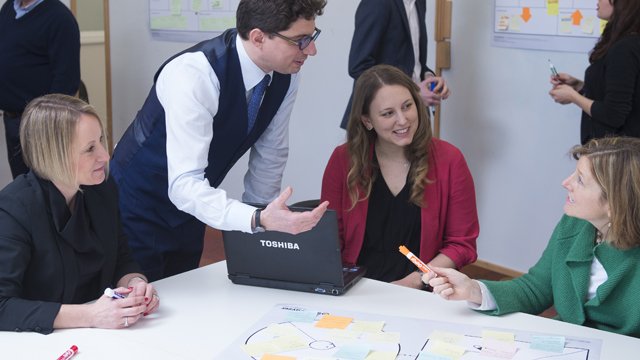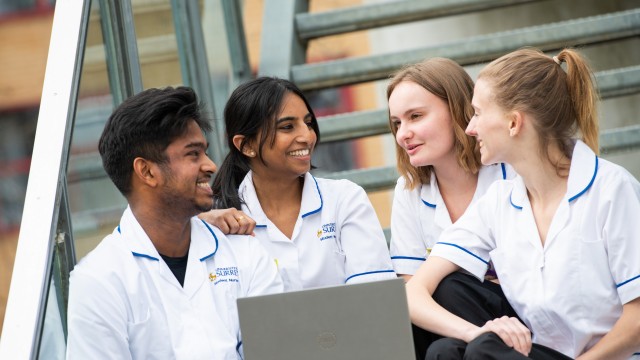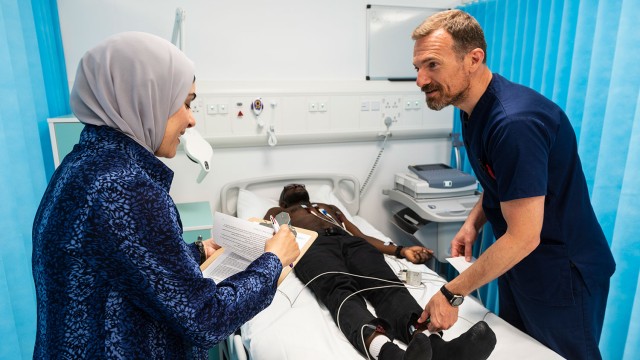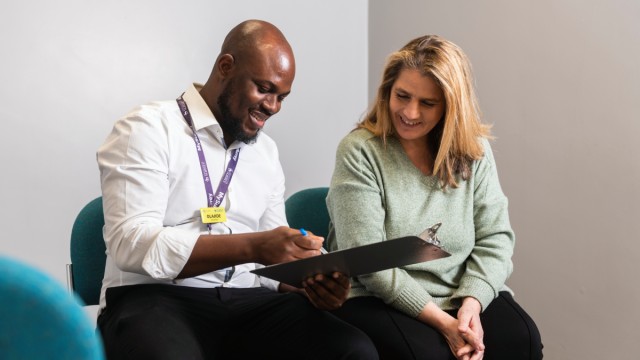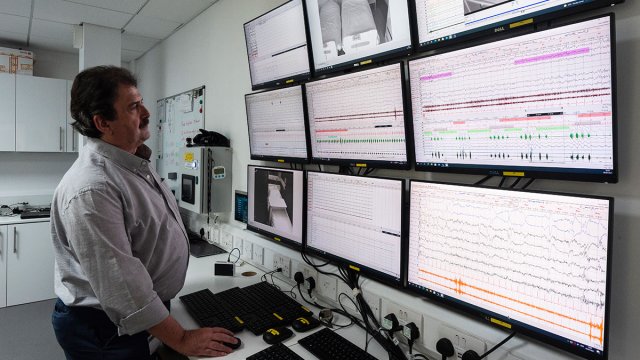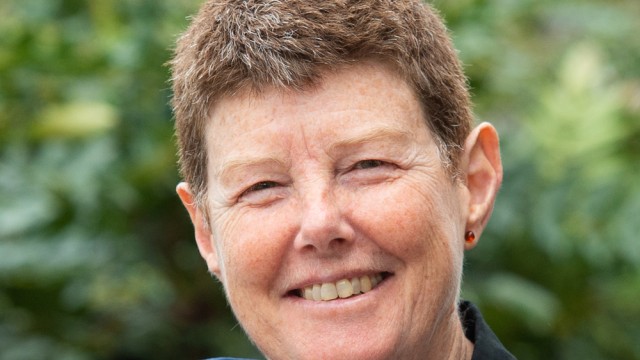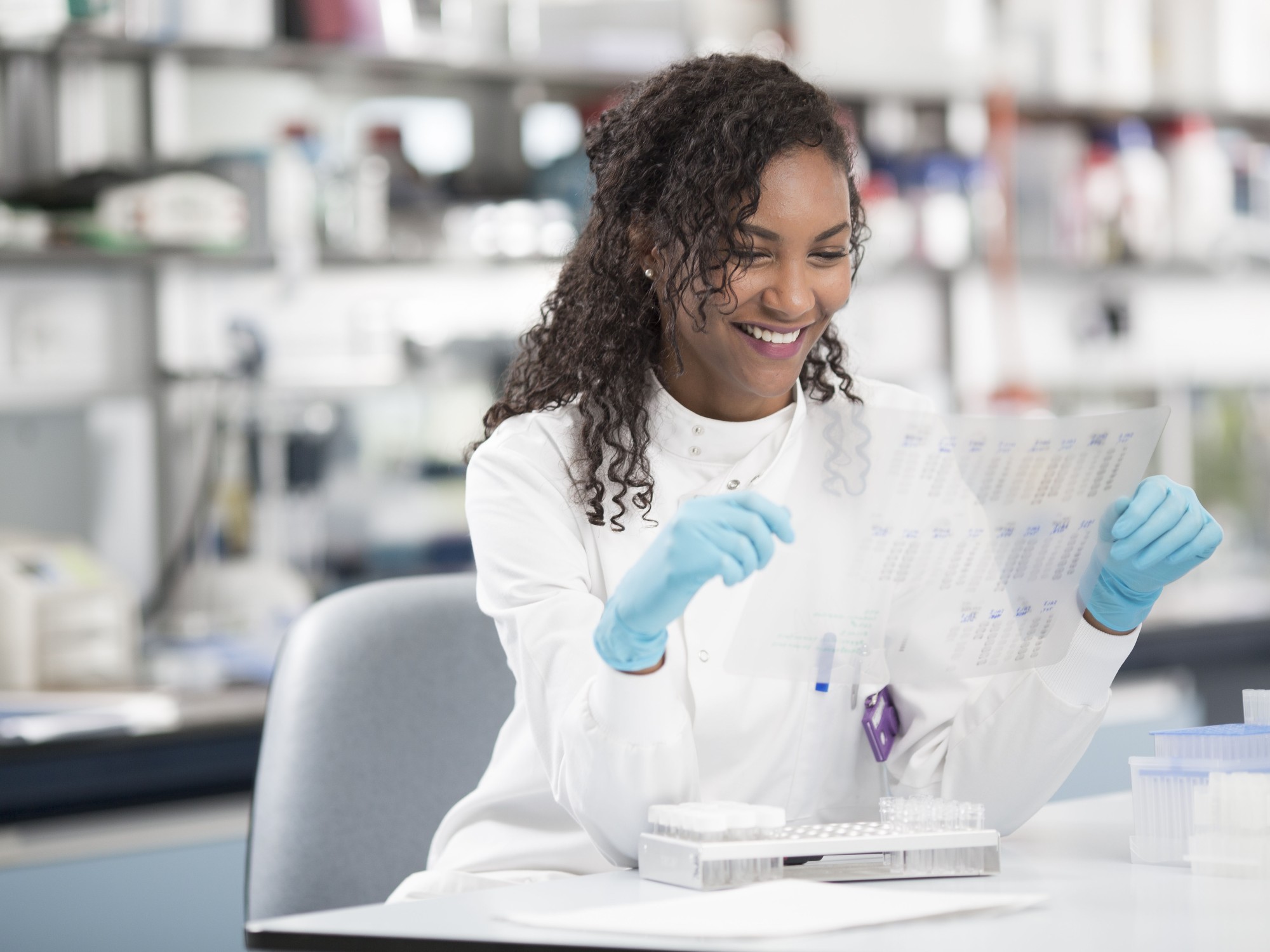
- Biosciences and Medicine
PhD Biosciences and Medicine
Our Biosciences and Medicine PhD will give you the chance to contribute to a fast-paced area of research that's becoming increasingly relevant to modern society. Enhance your laboratory and analytical skills, acquire a general awareness of contemporary biomedical research, and hone your ability to solve academic and practical problems.
4,138+ people have created a bespoke digital prospectus
Why choose this
programme?
- Champion our ‘One Health, One Medicine’ approach which brings together expertise from a broad range of multidisciplinary areas and collaboration with national and international partners.
- Complete research over a period of four years (full-time) or eight years (part-time).
- Embrace a ‘bench to bedside’ philosophy, with the potential to take part in molecular and computational studies as well as clinical trials.
- Work alongside Surrey’s world-leading researchers who are published in top academic journals, including Nature and The Lancet, and regularly give expert media commentaries.
Statistics
100%
Of our biosciences research graduates are in employment or further education (Graduate Outcomes 2025, HESA)
Top 20 for research outputs
The University of Surrey is ranked in the top 20 for the quality of our research outputs (REF 2021)
33rd for overall research quality
The University's overall research quality ranking has risen by 12 places to 33rd in the UK (REF 2021)
Studentships
Joint University of Surrey and A*STAR PhD studentships
Whilst the candidate is in the UK, University of Surrey funding will include UKRI-aligned stipend (£17,668 pa for 2025-6) and approved fees. When the candidate relocates to Singapore, A*STAR will provide funding consisting of: a stipend of SGD 3600/month, housing subsidy of SGD300/month, a one-time airfare grant to Singapore of SGD 1,500, a one-time settling-in allowance in Singapore of SGD 1,000, a one-time IT allowance of SGD 800, medical insurance and a conference allowance. Please note that the Surrey stipend will cease while the student is based in Singapore.
Fully funded PhD studentship in cardiovascular science
The Studentship is fully funded by a competitive external grant. Funding covers tuition fees at the Home rate, associated research expenses, funds for training/attending conferences and an annual tax-free stipend at UKRI rates (currently £20,780 per annum).
What you will study
Depending on your research project, you’ll most likely complete extensive laboratory work to generate data that will underpin your final thesis. Some research areas will be primarily or entirely related to the analysis of existing scientific or clinical data sets; however, all projects will require some statistical analysis. Some projects will be entirely conducted at Surrey, whereas others will involve collaboration with UK-based or international institutions.
Our current students are researching topics including:
- Combining multi-omic data analysis methods to increase understanding of key diseases, such as diabetes and cancer
- Computational approaches to modelling biological systems
- Developing the molecular and physiological bases of circadian rhythms, sleep, immunity and cardiovascular disease
- Defining the nutritional value of micro- and macro-nutrients
- Discerning host-pathogen (viruses and bacteria) interactions in health and disease
- Dissecting the molecular basis of and innovative ways to treat cancer, especially of the prostate
- Improving disease surveillance and health outcome measurements.
Assessment
Your final assessment will be based on the presentation of your research in a written thesis, which will be discussed in a viva examination with at least two examiners.
You have the option of preparing your thesis as a monograph (one large volume in chapter form) or in publication format (including chapters written for publication), subject to the approval of your supervisors.
You’ll have a confirmation assessment to formally review your project. If you're a full-time student, this will take place around 12-15 months into your studies or 24-30 months if you’re studying part-time. You’ll be required to submit a written report and successfully complete an oral examination.
Location
This course is based at Stag Hill campus. Stag Hill is the University's main campus and where the majority of our courses are taught.
Research themes
Our research investigates some of the following areas:
- Bacteriology, including leprosy, meningococcus, pathogenic E.coli, tuberculosis, and various foodborne pathogens
- Cardiovascular sciences, including blood coagulation, cardiac cell signalling pathways, gene therapy, tissue engineering, and the role of cardiac fibroblasts
- Chronobiology, including central and peripheral clock mechanisms, chrononutrition, molecular mechanisms underlying synchronisation of rhythms by light, melatonin, and food
- Clinical medicine, including cancer, critical care, diabetes, laparoscopic surgery, primary care, and clinical informatics
- Exercise sciences, including cognitive decline, dementia, DNA damage and repair, and osteoporosis
- Immunology, including B cell development and function, macrophage function, peroxisomal function in the immune system, and T cell function in ageing
- Metabolic medicine, food and macronutrients, including diabetes, metabolic physiology, Vitamin D, selenium and other micronutrients
- Public health and food security, including antimicrobial resistance, the effect of cell wall polysaccharides on nutrient digestibility, iodine deficiency in pregnant women, and selenium status
- Sleep, including circadian rhythms, mechanisms and functions of sleep, and sleep and cognition
- Statistical multi-omics, including dissecting the genetic architecture of complex human diseases, such as cancer and Parkinson’s disease
- Systems biology, including computational modelling, gene regulation through protein translation, molecular and metabolic network analysis
- Virology, including cellular responses to viral infection, regulation of virus protein synthesis and virus morphogenesis.
Research centres and institutes
Throughout your studies, you’ll have at least two supervisors from the School of Biosciences.
Your supervisors will have expertise relevant to your research project and will give you academic guidance and tuition, helping you develop your skills in experimental design, conduct and analysis. They’ll also give you pastoral support and advice, referring you to more specialist services where necessary.
Supervisors may include:
Research support
The professional development of postgraduate researchers is supported by the Doctoral College, which provides training in essential skills through its Researcher Development Programme of workshops, mentoring and coaching. A dedicated postgraduate careers and employability team will help you prepare for a successful career after the completion of your PhD.
Progress reviews
In addition to the confirmation process you’ll have six-monthly progress reviews with your supervisors. These meetings are an opportunity to reflect on your progress, discuss successes and challenges and set targets for the next six months. These reviews will be monitored by postgraduate research directors and recorded on your student record.
You’ll also have one formal meeting with your supervisors every month and can expect to have more frequent meetings between these. The regularity of these will depend on the nature and stage of your project.
Facilities
The School of Biosciences is home to world-class specialist facilities.
If you’re looking to research clinical sciences and human physiology, you’ll conduct your research in:
- Surrey Clinical Research Facility
- Surrey Human Performance Institute.
You might also use facilities at the nearby Royal Surrey County Hospital.
If you’re a molecular and cellular science researcher, you can use our facilities in:
- Bioimaging and flow cytometry
- Bioinformatics
- Metabolomics
- Phenomics
- Stable isotope-based analysis
- Transcriptomics.
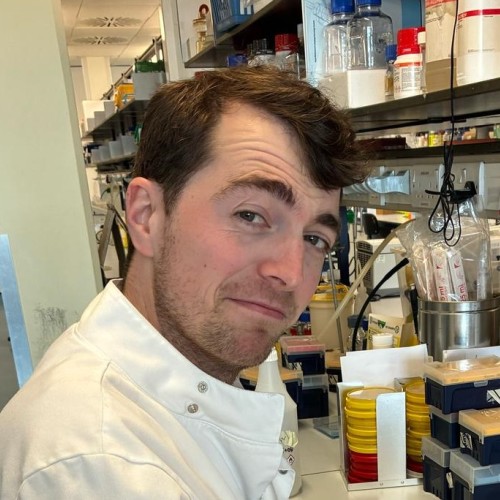
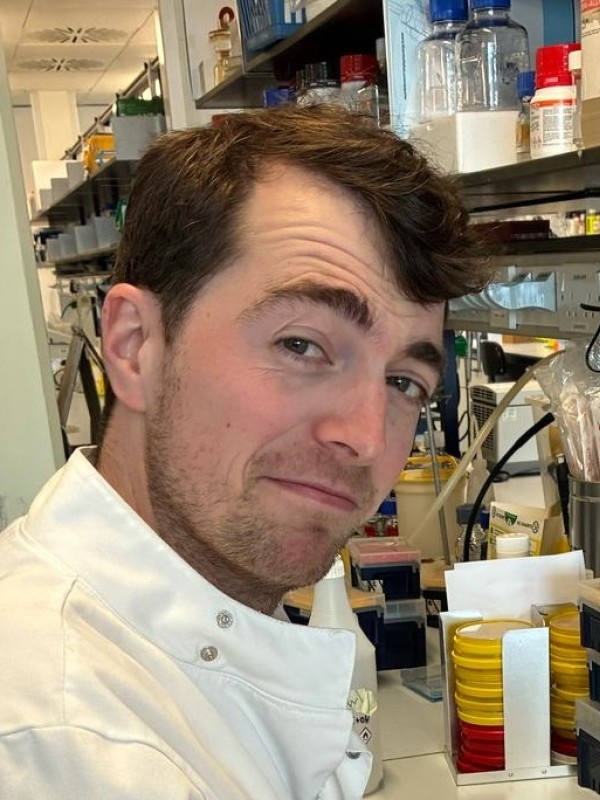
Jordan Pascoe
Student - Biosciences and Medicine PhD


Katie O’Brien
Student - Biosciences and Medicine PhD
UK qualifications
Applicants are expected to hold a minimum of an upper second-class (2:1) UK degree in an appropriate discipline, but prior experience in research or industry may be acceptable. Enthusiasm for, and commitment to, independent study is essential.
English language requirements
IELTS Academic: 6.5 or above (or equivalent) with 6 in each individual category.
These are the English language qualifications and levels that we can accept.
If you do not currently meet the level required for your programme, we offer intensive pre-sessional English language courses, designed to take you to the level of English ability and skill required for your studies here.
Selection process
Selection is based on applicants:
- Meeting the expected entry requirements and providing all relevant documents including a satisfactory research proposal
- Being shortlisted through the application screening process
- Completing a successful interview
- Providing suitable references.
Fees per year
Explore UKCISA's website for more information if you are unsure whether you are a UK or overseas student. View the list of fees for all postgraduate research courses.
* Please note: any start date other than September will attract a pro-rata fee for that year of entry (75 per cent for January, 50 per cent for April and 25 per cent for July).
July 2026 - Full-time
- UK
- £5,006
- Overseas
- £27,200
July 2026 - Part-time
- UK
- £2,503
- Overseas
- £13,600
October 2026 - Full-time
- UK
- £5,238
- Overseas
- £28,300
October 2026 - Part-time
- UK
- £2,619
- Overseas
- £14,200
January 2027 - Full-time
- UK
- £5,238
- Overseas
- £28,300
January 2027 - Part-time
- UK
- £2,619
- Overseas
- £14,200
April 2027 - Full-time
- UK
- £5,238
- Overseas
- £28,300
April 2027 - Part-time
- UK
- £2,619
- Overseas
- £14,200
- Annual fees will increase by 4% for each year of study, rounded up to the nearest £100 (subject to legal requirements).
Additional costs
There are additional costs that you can expect to incur when studying at Surrey.
Funding
A Postgraduate Doctoral Loan can help with course fees and living costs while you study a postgraduate doctoral course.
Studentships
Browse our frequently updated list of funded studentships open for applications.
Joint University of Surrey and A*STAR PhD studentships
Whilst the candidate is in the UK, University of Surrey funding will include UKRI-aligned stipend (£17,668 pa for 2025-6) and approved fees. When the candidate relocates to Singapore, A*STAR will provide funding consisting of: a stipend of SGD 3600/month, housing subsidy of SGD300/month, a one-time airfare grant to Singapore of SGD 1,500, a one-time settling-in allowance in Singapore of SGD 1,000, a one-time IT allowance of SGD 800, medical insurance and a conference allowance. Please note that the Surrey stipend will cease while the student is based in Singapore.
Fully funded PhD studentship in cardiovascular science
The Studentship is fully funded by a competitive external grant. Funding covers tuition fees at the Home rate, associated research expenses, funds for training/attending conferences and an annual tax-free stipend at UKRI rates (currently £20,780 per annum).
Application process
Applicants should contact potential supervisors before submitting an application via the website. Please refer to section two of our application guidance.
Apply online
To apply online first select the course you'd like to apply for then log in.
Select your course
Choose the course option you wish to apply for.
Sign in
Create an account and sign into our application portal.
The closing date is the last day this month is available for applications, but if you are applying through a studentship you must follow the deadline on the advert to be eligible.
ApplyThe closing date is the last day this month is available for applications, but if you are applying through a studentship you must follow the deadline on the advert to be eligible.
ApplyThe closing date is the last day this month is available for applications, but if you are applying through a studentship you must follow the deadline on the advert to be eligible.
ApplyThe closing date is the last day this month is available for applications, but if you are applying through a studentship you must follow the deadline on the advert to be eligible.
ApplyThe closing date is the last day this month is available for applications, but if you are applying through a studentship you must follow the deadline on the advert to be eligible.
ApplyThe closing date is the last day this month is available for applications, but if you are applying through a studentship you must follow the deadline on the advert to be eligible.
ApplyThe closing date is the last day this month is available for applications, but if you are applying through a studentship you must follow the deadline on the advert to be eligible.
ApplyThe closing date is the last day this month is available for applications, but if you are applying through a studentship you must follow the deadline on the advert to be eligible.
ApplyAfter registration
Students are initially registered for a PhD with probationary status and, subject to satisfactory progress, subsequently confirmed as having PhD status.
About the University of Surrey
Need more information?
Contact our Admissions team or talk to a current University of Surrey student online.
Code of practice for research degrees
Surrey’s postgraduate research code of practice sets out the University's policy and procedural framework relating to research degrees. The code defines a set of standard procedures and specific responsibilities covering the academic supervision, administration and assessment of research degrees for all faculties within the University.
Download the code of practice for postgraduate research admissions (PDF).
Terms and conditions
When you accept an offer to study at the University of Surrey, you are agreeing to follow our policies and procedures, student regulations, and terms and conditions.
We provide these terms and conditions at the offer stage and are shown again at registration. You will be asked to accept these terms and conditions when you accept the offer made to you.
View our generic registration terms and conditions (PDF) for the 2025/26 academic year, as a guide on what to expect.
Disclaimer
This online prospectus has been published in advance of the academic year to which it applies.
Whilst we have done everything possible to ensure this information is accurate, some changes may happen between publishing and the start of the course.
It is important to check this website for any updates before you apply for a course with us. Read our full disclaimer.
